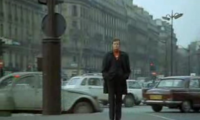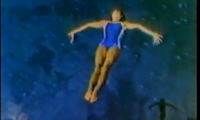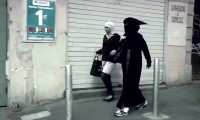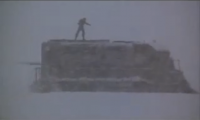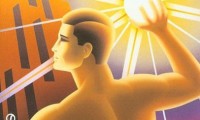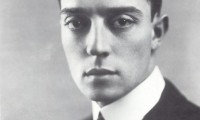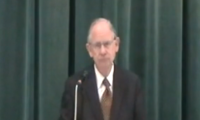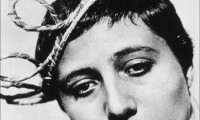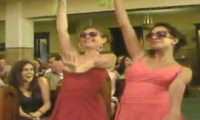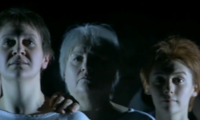TheTornadojo, “Paper Airplane Flight Over New York City” (2009)
I came late to the love of birds. For years I saw them only as a tremor at the edge of vision. They know the suffering and joy in simple states not possible for us. Their lives quicken and warm to a pulse our hearts can never reach. They race to oblivion. They are old before we have finished growing.
— from “The Peregrine” by J.A. Baker
I arrived in the city with no prospects. Was depressive and lonely. I had a love affair with a woman whose life was far more organized than mine. As such, she was untouchable, beyond the occasional ephemeral contact. Naturally, I fell in love with her.
rowanlubke, “Starlings Flocking at Eastbourne Pier” (2005)
So I began to write an imaginary version of her, transforming her into a quiet stranger I encountered in my daily commute — a girl named Molly who, like the barely touchable woman I loved, could make bird noises, very quietly, her lips close to my ear. I put it in a play:
I first met Molly on a streetcar. One day she sat down beside me, and I looked at her and realized she had the most miserable expression on her face I had ever seen. But that wasn’t the only thing I noticed about her: The other thing was I noticed she could make very quiet and very realistic bird noises without moving her lips at all. So you could be sitting right beside her, say on a streetcar and still not know where the sounds were coming from.
So I turned to her and I asked her, I said: “Why are you so unhappy?” And she said “Excuse me?” and I said, “Why are you so unhappy?” and she said, “Well I can’t tell you right now because this is my stop.”
Jeffrey Tran & Charuvi Agrawal, “Dundas N’Bathurst” (2007)
I took a lot of solace at that time from the idea of birds, though I did not actually seek them out in the environment. I loved the way Gilbert White wrote about them in his little book quietly penned in the middle of the French Revolution. I’d take the bus home from my mail room job, go up to my room in my shared house and close the door to the world. And then I’d read my little Penguin edition, casting myself into a gentle environment far away in space and time:
Bats drink on the wing, like swallows, by sipping the surface, as they play over pools and streams. They love to frequent waters, not only for the sake of drinking, but on account of insects, which are found over them in the greatest plenty.
— from “The Natural History of Selborne” by Gilbert White
Sometimes, I just lay there, flipped through the book and looked at the pictures:
trbnew, “The Natural History of Selborne: 1900 Edition” (2008)
In the city I didn’t see the birds, I didn’t hear them, my head was always down, my ears were closed, my nose was to the book or the stone. But it was true they were alive in my imagination because of Molly and also because of a story my mother had once told me about my grandfather, a man who had lived in this city once, who had helped build the Bloor Street Viaduct and who had engaged in a bit of boxing before moving back to North Bay. That his name was Joseph Raoul Marceau, that he was a very hairy man, that he used to make bird-noises in his sleep.
Jarbas Agnelli, “Birds On A Wire Compose A Song” (2009)
In the isolation of my daily routine, I was looking more at the people I saw all around me on the streetcars and subways and thinking of them as birds. Like Molly, my imaginary lover, closer to me than the real one.
I saw a little video recently that brought me back to that enclosed, introverted, pre-social-networking time of my early twenties.
hMarcus Coates, “Dawn Chorus” (2007).
The above clips are all examples of human speech, sped up. Nothing more.
The life of a bird is ephemeral. It goes by as fast as the run of a play. I wrote the rough draft of this little post last fall, when I could hear birds chittering everywhere in the city. I would sit and watch the swallows swoop after mosquitoes in the last light of day, before being replaced by the bats. I would see the sparrows in the eaves, the starlings congregating in front yards, the occasional hawk in the occasional tree, resting after a flight from downtown. I could see that they had moved out of my head and into the city around me. When did that happen? I thought, ‘I must be getting older. I have the capacity to pay attention to the real world, outside of my daydreams and night dreams, my evening room readings. The world’s become larger and fuller, with a whole bunch of living things, just in time for those old introverted feelings to come around again.’
Love, too, has become more quiet and more real, no longer a breathless leap into the unknown, no longer a smudge of red floating over the hard landscape, letting bits get whisked away in the contrail.
Go Pro, “Graham Dickinson’s Insane Wingsuit Flight” (2015)
These days, things are different again. Now it’s winter, and I’m not noticing the birds so much. Except the other day when I saw some fat chickadees in a bush and thought, ‘they love it there; they’re safe from the hawks there, they can be sociable in there.’ Whereas I’m just trying to get through it, the winter, seeking solace in human company.
But I’m also reminded that in winter, when you’re old, with failing eyesight and sore bones, you can still find some solace in memory and metaphor, poetry and music—the birds that you see in your mind, not so much with your eyes. You’ve learned to see the outside world completely, but the inner world is just as strong. The timbre of the voice is cracked and old but sometimes it’s youthful too. The two states of life have achieved some kind of harmony in there, maybe. Balance. No? Is that a stupid thing to say?
Leonard Cohen, “Bird On A Wire” (London, 2013)
– Sean Dixon
